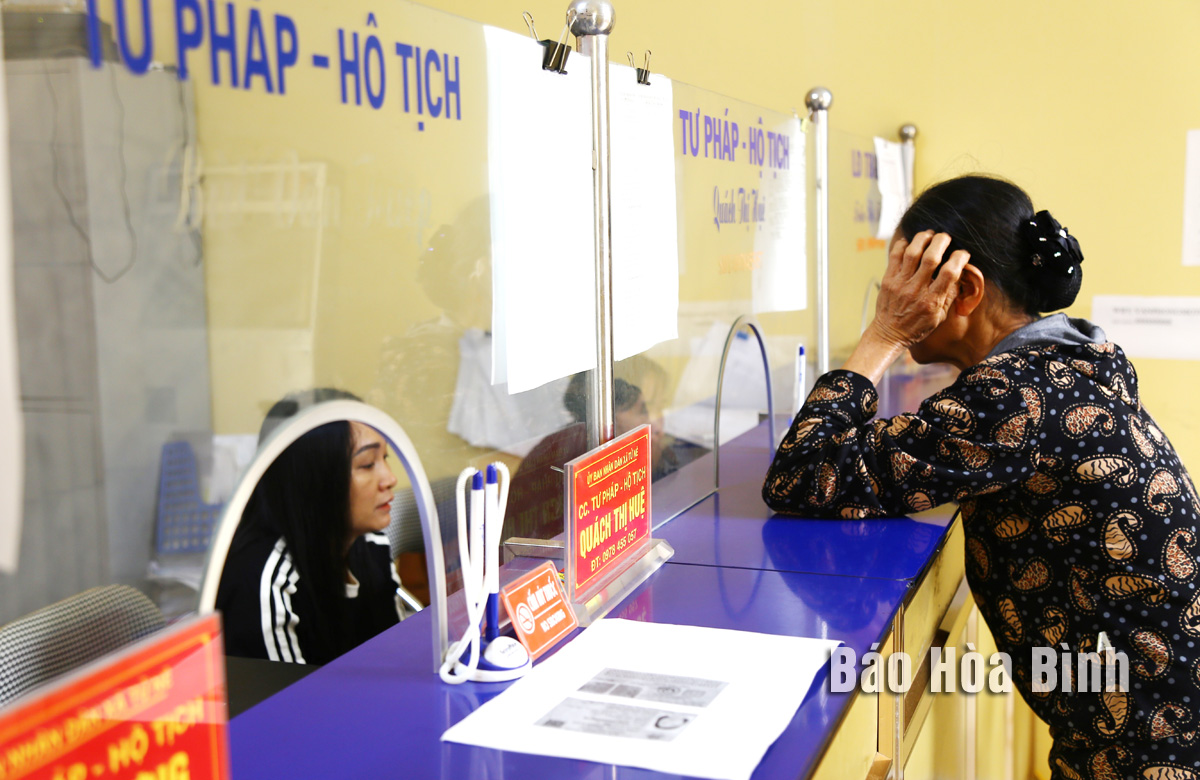
Over recent times, the implementation of the single-window mechanism for administrative procedure settlement in electronic environments at various units and localities has seen positive changes.
In Tu Ne commune, Tan Lac district, a staff at the
local section for public administrative reception and result return offers
guidance for a resident.
In Tu Ne commune, Tan Lac district, a considerable number of people arrived
early in the morning to carry out administrative procedures at the local
section for administrative reception and results return.
Bui Thi Mo shared her experience: "I came here to apply for my
grandchild's birth certificate. As it's my first time dealing with this
procedure, I was a bit confused. However, I felt relieved thanks to the staff’s
meticulous and efficient guidance."
In 2023, the mechanism was effectively executed at the provincial centre for
public administrative services as well as the reception and result return units
across all local districts, city, communes, wards, and towns. The on-time file
resolution rate by provincial specialised agencies reached 99.7%.
However, shortcomings remain such as the emergence of additional required
documents not complying with regulations and the complex and cumbersome of some
procedures. The digitisation and reuse of digitised data of files have yet to
meet requirements, while the coordination among public agencies involved in the
process remains ineffective. There has also been a failure to report, explain,
and apologise to citizens and businesses regarding overdue files, especially in
the field of land.
To overcome these limitations, the chairman of the provincial People's
Committee has instructed enhancing the role and responsibility of the heads of
agencies and further implementing the single-window mechanism as prescribed.
Also necessary are timely review, reduction and simplification of procedures
and business regulations to create convenience and reduce costs for citizens
and enterprises.
Stressing the importance of public disclosure and transparency, the leader
requested all administrative documents be digitised according to regulations
and digitisation linked to the completion of tasks by public personnel
involved.
Hoa Binh province is undergoing a dynamic transformation amid Vietnam’s national digital transition. Building on Poliburo’s Resolution No. 57-NQ/TW on breakthroughs in science, technology, innovation, and national digital transformation, the province has rolled out a wide range of practical action plans. A standout initiative is the "Digital Literacy for All” movement, an effort to ensure that no one is left behind in the digital era.
Hoa Binh province is undergoing a dynamic transformation in the wake of the national digital transformation movement. Building on Resolution No. 57-NQ/TW of the Politburo on breakthroughs in science, technology, innovation, and national digital transformation, the province has implemented a wide range of practical action plans. A standout initiative is the "Digital Literacy for All” movement ambitious effort to ensure that no one is left behind in the digital age.
With a spirit of unity and proactive problem-solving, the Party Committee, the government and the people of Dong Lai Commune (Tan Lac District) have made great strides in implementing the resolutions of the 24th Party Congress of the commune for the 2020 - 2025 term. Focusing on leadership and practical actions, the commune has brought the Party’s resolutions into daily life, creating strong impacts and pushing the local development forward.
Amid the nationwide push for digital transformation, young people in Hoa Binh Province are stepping up as dynamic pioneers, applying technology to enhance Youth Union operations and expand the reach of youth-led initiatives. Through creativity and adaptability, Youth Union organizations at all levels have introduced a series of practical solutions, contributing to modern governance and community development.
In recent years, An Nghia commune, located in Lac Son district, has stepped up administrative reform, focusing on improving the quality and efficiency of its single-window service unit for receiving and processing administrative procedures. These improvements have helped create favourable conditions for local residents and organisations to handle administrative procedures, contributing to the commune’s broader socio-economic development.
The Prime Minister-approved master plan to develop the multi-use value of forests ecosystems through 2030, with a vision to 2050, aims to improve the management and sustainable use of forest resources, create jobs, increase incomes, and improve the living standards of ethnic minorities, people in mountainous and remote areas, forest workers and those living near forests.



